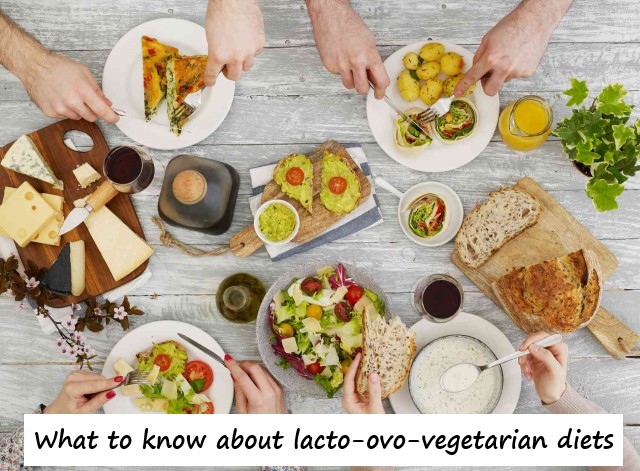A lacto-ovo-vegetarian diet includes eggs and dairy but avoids other animal products. Some research associates vegetarian diets with health benefits, such as reducing inflammation and lowering blood pressure.
However, people should try to avoid too many processed foods, which can negate these health benefits. Instead, they should focus on eating whole foods.
This article https://thevegangarden.com/‘s defines what a lacto-ovo-vegetarian diet is and looks at what the evidence says about its health benefits and potential risks. It lists what to eat and what to avoid and gives an example of a 5-day meal plan.
What is a lacto-ovo-vegetarian diet?
A lacto-ovo-vegetarian diet excludes meat, poultry, and fish but includes eggs and dairy products. People commonly refer to this dietary pattern simply as a vegetarian diet.
The word “lacto” refers to milk, and “ovo” refers to eggs. Similarly, someone could choose to follow a lacto-vegetarian diet, excluding eggs but consuming milk.
People may follow a lacto-ovo-vegetarian diet for ethical reasons, such as animal rights or to help the environment. Other people choose the diet for health or religious reasons, or simply as a personal preference.
As farmers do not slaughter animals to obtain eggs, milk, and honey, many vegetarians choose to eat these foods. However, some people who follow a vegan diet may argue that the dairy and egg industries do involve slaughter or other animal cruelty and that producing honey exploits bees.

Health benefits
A vegetarian diet that includes whole foods, fruits, and vegetables can help reduce a person’s risk of some chronic diseases. The following looks at what the evidence says about potential health benefits.
Anti-inflammatory
A 2019 review and meta-analysis indicated that people eating a vegetarian diet might have lower levels of the inflammatory markers C-reactive protein and fibrinogen.
According to the authors, these inflammatory markers are a risk factor for cardiovascular disease, diabetes, and metabolic syndrome. They also suggest that lower body mass index (BMI) scores among vegetarians may, in part, account for the anti-inflammatory effects.
Furthermore, eating a wide range of plant foods means that vegetarians may consume higher amounts of antioxidants, which are anti-inflammatory and beneficial to health.
Lowering blood pressure
A 2020 systematic review and meta-analysis concluded that there is a link between vegetarian diets and significant reductions in blood pressure compared with omnivorous diets. This may play a key role in managing hypertension.
The same review indicated that vegetarian diets are low in cholesterol and saturated fat and high in antioxidants, and these factors can lower blood pressure.
Preventing diabetes
A 2017 meta-analysis of data from 14 studies indicated that a vegetarian diet could reduce the risk of diabetes.
The authors suggest that a lower BMI may contribute to the reasons for this, which also include eating risk-reducing foods such as whole grains and vegetables.
Managing weight
A 2021 review suggests that vegetarians may have better control of their weight in the long term and may adhere to vegetarian diets better than people who follow other diets, such as paleo, weight loss, or gluten-free.
However, the review pointed out that some studies have highlighted increased anxiety and eating disorders among vegetarians, raising the possibility that young people may adopt the diet to limit their food intake.
There are potential risks of a vegetarian diet, particularly for certain groups of people. There are also some myths about the diet’s nutritional inadequacies.
Inadequate protein myth
Some people have concerns that vegetarian diets do not provide adequate protein or amino acids.
However, a 2019 review indicated that vegetarians consume an average of 1.04 grams (g) of protein per kilogram (kg) of body weight, according to two large studies. This amount is higher than the Recommended Dietary Allowance (RDA) of 0.8 g/kg body weight.
The same review also analyzed the amino acid profile of vegetarian diets. The authors concluded that when diets are at least slightly varied, choosing plant proteins with complementary amino acid patterns is overcautious.
Groups of people at risk
People of certain ages should be careful to ensure that they consume enough essential nutrients on a vegetarian diet.
The Dietary Guidelines for Americans advise that young children and people who are pregnant, breastfeeding, or chestfeeding should seek nutritional advice on following a vegetarian diet.
Depending on how many animal products they include in the diet, there is a risk that they may not meet daily requirements for nutrients such as vitamin B12, iron, and omega-3 fatty acids.
Similarly, older people who may have limited cooking resources or access to healthy food may miss essential nutrients by following a vegetarian diet.
Groups of people who may be at risk can choose to take a vegetarian supplement. However, they should choose a product that does not contain a gelatine capsule.
Processed foods
Another potential risk of a vegetarian diet is that someone may choose more processed foods than whole foods.
The recent boom in plant-based diets means that many “junk food” alternatives are available with higher sugar, fat, and salt levels than whole food ingredients.
Eating too many processed foods can cause weight gain and feelings of lethargy and fatigue.
